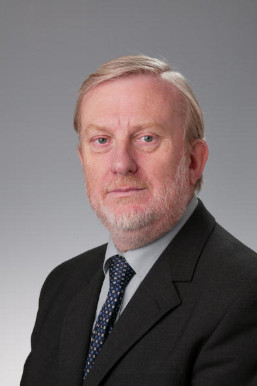
Andrew Peter Miller was a British Labour politician and scientist who served as Member of Parliament (MP) for Ellesmere Port and Neston from 1992 to 2015.

Margaret Lucy Sharp, Baroness Sharp of Guildford is a former member of the House of Lords of the United Kingdom. She sat as a Liberal Democrat.
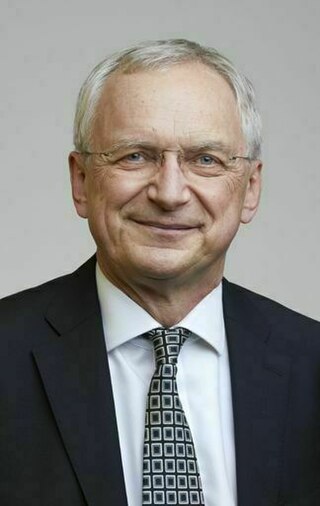
Sir Andrew Hopper is a British-Polish computer technologist and entrepreneur. He is Chairman of lowRISC CIC, a Commissioner of the Royal Commission for the Exhibition of 1851, former Treasurer and Vice-President of the Royal Society, Professor Emeritus of Computer Technology at the University of Cambridge, an Honorary Fellow of Trinity Hall, Cambridge and Corpus Christi College, Cambridge.
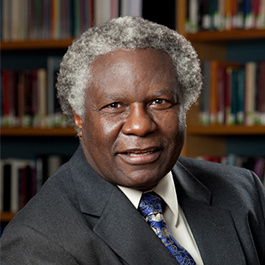
Calestous Juma was a Kenyan scientist and academic, specializing in sustainable development. He was named one of the most influential 100 Africans in 2012, 2013 and 2014 by the New African magazine. He was Professor of the Practice of International Development and Faculty Chair of the Innovation for Economic Development Executive Program at Harvard Kennedy School. Juma was Director of the School's Science, Technology and Globalization Project at Harvard Kennedy School as well as the Agricultural Innovation in Africa Project funded by the Bill and Melinda Gates Foundation.
Henry Isaac Ergas is an economist who has worked at the OECD, the Australian Trade Practices Commission as well as at a number of economic consulting firms. He chaired the Australian Intellectual Property and Competition Review Committee set up by the Australian Federal Government in 1999 to review Australia's intellectual property laws as they relate to competition policy.

Andy Miah is an English bioethicist, academic and journalist. His work often focuses on technology and posthumanism.
Sir Roy Malcolm Anderson is a leading international authority on the epidemiology and control of infectious diseases. He is the author, with Robert May, of the most highly cited book in this field, entitled Infectious Diseases of Humans: Dynamics and Control. His early work was on the population ecology of infectious agents before focusing on the epidemiology and control of human infections. His published research includes studies of the major viral, bacterial and parasitic infections of humans, wildlife and livestock. This has included major studies on HIV, SARS, foot and mouth disease, bovine tuberculosis, bovine spongiform encephalopathy (BSE), influenza A, antibiotic resistant bacteria, the neglected tropical diseases and most recently COVID-19. Anderson is the author of over 650 peer-reviewed scientific articles with an h-index of 125.
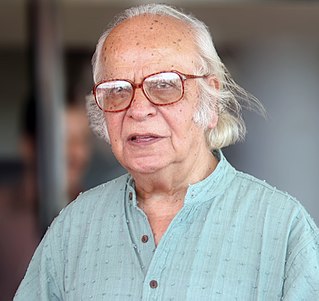
Yash Pal was an Indian scientist, educator and educationist. He was known for his contributions to the study of cosmic rays, as well as for being an institution-builder. In his later years, he became one of the leading science communicators of the country.
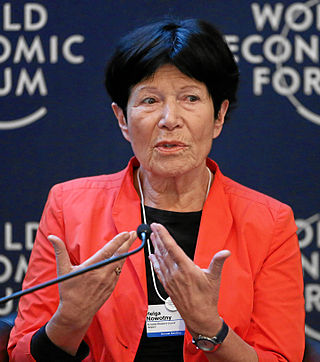
Helga Nowotny is Professor emeritus of Social Studies of Science, ETH Zurich. She has held numerous leadership roles on Academic boards and public policy councils, and she has authored many publications in the social studies of science and technology.
Ashok Jhunjhunwala is an Indian academic and innovator. He received his B.Tech. from the Indian Institute of Technology, Kanpur and PhD from the University of Maine. He has been a faculty member at the Indian Institute of Technology Madras since 1981. He is the President of IIT Madras Research Park and Chairman of International Institute of Information Technology, Hyderabad. During his career, he has contributed extensively to technology innovation and adoption in the Indian context.
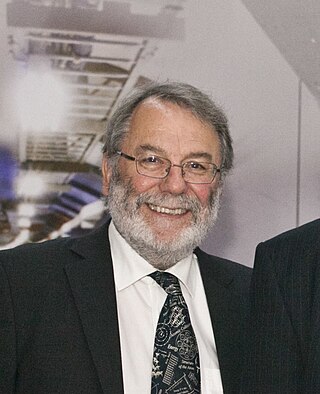
Sir Peter Leonard Knight is a British physicist, professor of quantum optics and senior research investigator at Imperial College London, and principal of the Kavli Royal Society International Centre. He is a leading academic in the field of quantum optics and is the recipient of several major awards including the Royal Medal from the Royal Society and the Thomas Young Medal and Prize from the Institute of Physics. He is a former president of the Institute of Physics and Optica, the first non North American-based person to take the position.
The Columbia Institute for Tele-Information (CITI) is one of several research centers for Columbia Business School, focusing on strategy, management, and policy issues in telecommunications, computing, and electronic mass media. It aims to address the large and dynamic telecommunications and media industry that has expanded horizontally and vertically drive by technology, entrepreneurship and policy.
Omar bin Abdul RahmanP.S.M., J.M.N., J.S.M. is a Malaysian academic and corporate figure. He is currently the president and CEO of the MUST Ehsan Foundation, a nonprofit foundation that manages and administers the Malaysia University of Science and Technology (MUST).
The STEPS Centre was an interdisciplinary research centre hosted at the University of Sussex, funded by the Economic and Social Research Council. The Centre's research brought together development studies with science and technology studies. It was launched at Portcullis House in London on 25 June 2007 and closed in 2022.

The Science Policy Research Unit (SPRU) is a research centre based at the University of Sussex in Falmer, near Brighton, United Kingdom. Its research focuses on science policy and innovation. SPRU offers MSc courses and PhD research degrees. In 2018, SPRU ranked 3rd in the world and 1st in the UK for top science and technology think tanks on the Global Go To Think Tank Index Report.
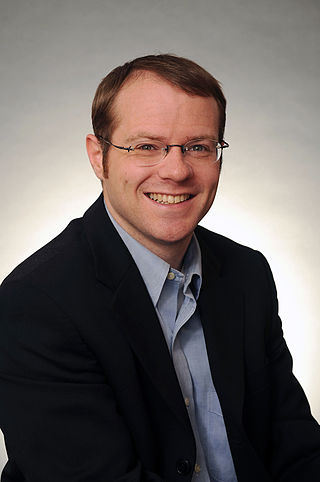
Benjamin K. Sovacool is an American and British academic who is director of the Institute for Global Sustainability at Boston University as well as Professor of Earth and Environment at Boston University. He was formerly Director of the Danish Center for Energy Technology at the Department of Business Development and Technology and a professor of social sciences at Aarhus University. He is also professor of energy policy at the University of Sussex, where he formerly directed the Center on Innovation and Energy Demand and the Sussex Energy Group. He has written on energy policy, environmental issues, and science and technology policy. Sovacool is also the editor-in-chief of Energy Research & Social Science.
Professor Asher Tishler is an Israeli economist and former president of the College of Management Academic Studies.
Professor Helen Rees OBE GCOB D.Sc. Medicine LLD is a medical doctor, and the founder and executive director of Wits RHI, the largest research Institute at the University of the Witwatersrand in Johannesburg, South Africa. She is a Personal Professor in the University of Witwatersrand's Department of Obstetrics and Gynaecology, co-director and co-founder of the Wits African Leadership in Vaccinology Expertise (ALIVE), Honorary Professor in the Department of Clinical Research at the London School of Hygiene and Tropical Medicine and an Honorary Fellow at Cambridge University's Murray Edwards College, UK.

Melissa Leach, is a British geographer and social anthropologist. She has been the Executive Director of the Cambridge Conservation Initiative since June 2024. She studies sustainability and development concerns in policy-making and has a focus on the politics of science and technology of Africa. She was previously the Director of the Institute of Development Studies (2014-2024) located on the University of Sussex campus.

Nicole Grobert FRSC FYAE is a German-British materials chemist. She is a professor of nanomaterials at the Department of Materials at the University of Oxford, fellow of Corpus Christi College, Oxford, and a Royal Society industry fellow at Williams Advanced Engineering. Grobert is the chair of the European Commission's Group of Chief Scientific Advisors.











